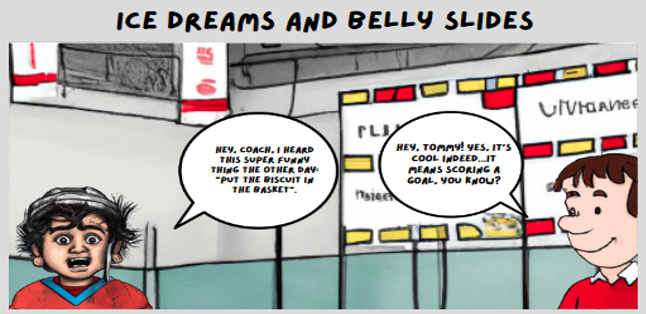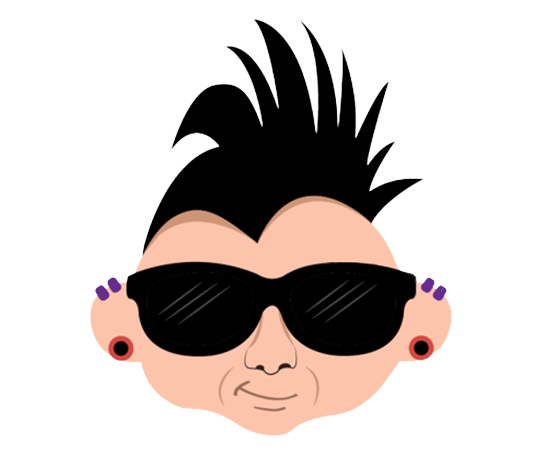Game On

I can trace my first love of hockey back to my introduction to ice skating. It comes in the form of a recurring memory of the first time I learned how to skate. It’s vivid, frequent and comes to me still to this day. I think it was the first time I discovered I could do something well. For a three-year-old, this is earth shattering.
But before we get too far into the story, maybe a little context.
We lived in a small farming community outside of Buffalo. Life was simple. The community was down to earth, sometimes a bit too conservative, but people were always kind to one another. They never imposed. We had two black labs, grew our own vegetables, and watched the thunderstorms from our open garage—counting the beats between thunder and lightning. It was amazing and far from city life.
The winters were bitterly cold, often with the wind-chill factor at minus 30 degrees, and the summers were sticky and humid. The community had one arena, which was a central part of community life. Around the arena were fields—treacherous for young kids whether the field was warm and muddy or frozen and jagged. And in the summer, life in the arena revolved around lacrosse. In the winter, it was ice hockey.
My mother taught figure-skating at the arena to the young girls in the area. She spent three afternoons a week there, 2 hours at a time, teaching backward and forward skating, two-foot spins, t-stops, crossovers, and the like. There were typically a handful of girls on the ice at a time, laughing, falling and best of all learning.
I was not in school yet, so I would sit and watch from behind the reinforced glass. Not the rink glass, but the only warm section in the arena: the canteen. I would sit each time my mother coached the girls in fascination. The cheap plastic seats were too low, so to see through to the arena I had to sit on the table.
My mother didn’t know at the time, but with every practice session she held with her figure skaters, I was absorbing everything. A proverbial sponge soaking in everything I saw. And given the sparse landscape in our little farming community, the number of stimuli being thrown off for a three-year-old was massive.
After a few weeks of watching, I interrupted my mother singing to herself in the car one day.
“Mommy, I want to try skating!” I exclaimed.
She didn’t respond at first.
My world was small and focused then. All I could think of was why she was stopping me. ‘What was happening?’
I would have no idea of all of the thoughts and concerns that were flowing through my mother’s head at the time—the risk of injury, the cost to buy the skates, the time to teach me, and so on.
After a while, she responded with a quiet “…let me think on it sweetie.”
At dinner that night, my mother mentioned it to my dad—freshly home from a two-week business trip. They both laughed wryly, but my dad quickly turned to me and smiled and ruffled my hair.
“Of course.”
I’m not sure what my mother was expecting that day my father laced up the used steel-blade skates—which seemed to come from another century. The brown and black leather was thin and worn, but I didn’t care. I’m pretty sure she was expecting me to fall right away and leave the ice crying. But it was amazing. The ice cracked beneath me, and a cold air wound its way across my face and through my hair and ears. My heart beat excitedly, and I began to put one foot in front of the other, crossing over awkwardly in the corners, desperately trying to remember everything I had seen my mother teach the other girls. And this is what I remember: the blur of skating around the arena; the brightness of the lights; feeling the coldness chaff my face; and my breath emerging from my mouth with each deep breath, as if I was a steam engine pushing up a hill. All the while, my mother stood fixed at center ice, with the other girls nervously standing idle around her.
‘Who was this monster on skates? Did he not see the rest of us here?’ They asked themselves.
No, he did not. And it was exhilarating.
Things started to happen after that. My Dad invited me to watch Hockey Night in Canada every Saturday night. We had an old black and white TV then, which we watched from our den. The light flickered off the ceiling in the darkness, but spending this time with my father was great. He would drink Carlsberg out of a stubby beer bottle, and I would anxiously wait for Peter Puck to come on during the intermissions.
We continued this tradition of watching hockey throughout our lives. He drove me to and attended many of my early-morning practices, games and tournaments. We would stop at a pub or tavern on the way home, and he would deconstruct my performance. And later in life, he would travel with my adult friends when we participated in senior hockey tournaments. They loved him.
A few years ago, my father died of Parkinson’s. It’s an awful disease that both takes your soul and physicality simultaneously. Imagine seeing a person fade away in slow motion over the course of five to ten years and then perishing from some secondary immunological issue, such as pneumonia. The very thing that if healthy they would have gotten over in a few days.
Before he passed away, I took him to a professional hockey game. He was wheelchair-bound at the time, so we managed to get seats in a part of the arena I’d never been before. It was a special section, high up in the arena, where there are spots allocated for wheelchairs, but not seats. So, I stood behind my father, and we watched two NHL teams battle it out. I enjoyed the game for what it appeared to be: our last one together. But, one thing I’ll never forget is that through the latter dementia and the ravaging of his body by Parkinson’s, there was a spark of excitement in his eye. Somewhere inside him, he was still alive. And hockey was giving him that life.
Before sitting down to write this, I was watching the Hurricanes play the Lightning. The ‘Canes’ are a solid team, and they move the puck around like it’s nobody’s business. But as I watched the game, much like any game I watch these days, I imagined my father sitting there beside me—likely shouting at the TV as if the players could hear his off-ice coaching. But I also saw the moves I was trying to learn and emulate as a kid; I felt the tremendous friendships I’ve been privileged to forge over the years; I thought about the incredibly powerful life and leadership lessons that hockey has taught me; I tried to frame myself in the hungriness and humbleness that typifies a hockey player; and I thought about my roots.
It's tough to put into words the power that hockey has brought to my life—the thread that continues to weave my past to my present to my future. And because of this, I want to share what I’ve learned and continue to observe with this amazing sport called hockey.
I have no idea where this journey will go, but as we used to say as kids: “Game On!”

Member discussion